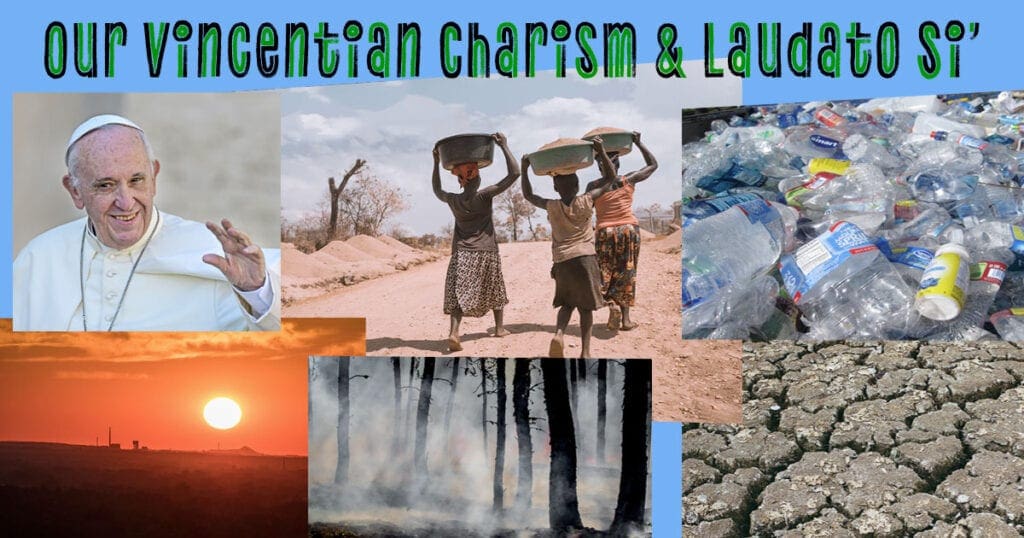“I would like to enter into dialogue with all people about our common home.” (3) With these words Pope Francis enters new territory for an encyclical which is usually written for members of the Catholic Church. He underlines the importance of “a new dialogue about how we are shaping the future of our planet. We need a conversion which includes everyone,” he writes, “since the environmental challenge we are undergoing and its human roots, concern and affect us all.” (14)

The title of the encyclical, Laudato Si’ (Praised Be to You) is taken from the famous “Canticle of the Sun” by St. Francis of Assisi. The subtitle “On Care for Our Common Home” expresses his deep understanding of both Earth as oikos which is the Greek root of the word “ecology” and means “home”, as well as the importance of caring, a significant element in the liberation theology of Latin America.
He begins the encyclical by quoting from earlier Popes as well as St. Francis and the Ecumenical Patriarch of Constantinople, Bartholomew, on the environment. He also recognizes United Nations (UN) and civil environmental initiatives, mentioning specifically the 1992 Earth Summit in Rio de Janeiro and the Earth Charter and the Rio+20 Earth Summit in 2012.
Pope Francis spent more than a year writing Laudato Si’. The final document reflects not only his own understanding of scientific concepts, but also represents input from many theologians, philosophers, and scientists. He timed the release to influence three major world events: the international Financing for Development Conference in Ethiopia in July of 2015, the ratification of the Sustainable Development Goals by the UN General Assembly in September of 2015 and the Conference of the Parties, a gathering of world leaders on the climate issue, in Paris in December of 2015.
The thread which ties the key concepts of the encyclical together is Francis’ continued repetition that everything is connected; that we are interdependent and the actions of one individual or one country affects the whole. He continually emphasizes that the problems facing humanity are not isolated but integrally connected. In his own words “The human environment and the natural environment deteriorate together; we cannot adequately combat environmental degradation unless we attend to causes related to human and social degradation. (48) He sees addressing both environmental and social crises as a moral issue stating that “Authentic human development has a moral character” and that “it presumes full respect for the human person, but must also be concerned for the world around us.” (5)
He states very clearly that “a very solid scientific consensus indicates that we are presently witnessing a disturbing warming of the climatic system…accompanied by a constant rise in the sea level…an increase of extreme weather events…” and that “a number of scientific studies indicate that global warming in recent decades is due to the great concentration of greenhouse gases released mainly as a result of human activity.” (8)
Quoting from the Bolivian Bishops’ Conference he states that “Both everyday experience and scientific research show that the gravest effects of all attacks on the environment are suffered by the poorest.” (26) The connection made between climate change and poverty is reiterated throughout the document and supports the finding of the United Nations Intergovernmental Panel on Climate Change (UN IPCC) report of 2014 which also clearly articulates the connection between climate change and poverty with these words “…those who are ‘socially, economically, culturally, politically, institutionally or otherwise marginalized’ will be most affected by drastic changes in the climate.” The IPCC continues, “Climate change produces more extreme weather. And when horrible storms hit, poor communities are affected worse than rich ones.”
Another theme which surfaces repeatedly is the concept of the common good as illustrated in the following passages:
“Human ecology is inseparable from the notion of the common good, a central and unifying principle of social ethics.” (156)
“…the common good calls for social peace, the stability and security provided by a certain order which cannot be achieved without particular concern for distributive justice.” (157)
“The climate is a common good belonging to all and meant for all.” (23)
He challenges politicians not to allow themselves to be subject to the economy nor “the economy subject to the dictates of an efficiency-driven paradigm of technocracy.” (169) He minces no words when he states that “Politics itself is responsible for the disrepute in which it is held on account of corruption and the failure to enact sound public policies.” He states clearly that “What is needed is a politics which is far-sighted and capable of a new, integral and interdisciplinary approach to handling the different aspects of the crisis…if politics shows itself incapable of breaking such a perverse logic, and remains caught up in inconsequential discussions, we will continue to avoid facing the major problems of humanity.” (197)
On the role of technology he cautions that every advance must not be viewed simply in terms of its economic benefits without concern for the potentially negative impact on society. He further cautions against an overreliance on technology to solve environmental and social problems without recognizing the “mysterious network of relations between things” lest one problem is solved only to create others.
Caroljean Willie, SC, Ph.D.
Program Director
EarthConnection
Sisters of Charity, Cinncinati
The Vincentian Charism and Laudato Si’ is our effort to share various ways that Vincentians find their charism connects with Laudato Si’. We encourage your comments on these posts and welcome anyone interested in submitting an article to email Jim Paddon at jpssvp@hotmail.ca.







0 Comments